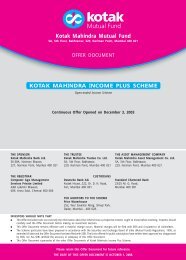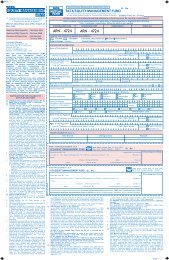OFFER DOCUMENT
Balanced Offer Document - Appuonline.com
Balanced Offer Document - Appuonline.com
- No tags were found...
Create successful ePaper yourself
Turn your PDF publications into a flip-book with our unique Google optimized e-Paper software.
Prudential ICICI Mutual Fund<br />
17) The Scheme may also use various hedging and derivative products from time to time, as are available and permitted<br />
by SEBI, in an attempt to protect and enhance the interests of the Unitholders at all times.<br />
18) The Mutual Fund having an aggregate of securities which are worth Rs.10 crores or more, as on the latest balance<br />
sheet date, shall subject to such instructions as may be issued from time to time by the Board, settle their transactions<br />
entered on or after January 15, 1998 only through dematerialised securities. Further, all transactions in government<br />
securities shall be in dematerialised form.<br />
i) Underwriting by the Fund<br />
Subject to the Regulations, the Scheme may enter into underwriting agreements after the Fund obtains a certificate of<br />
registration in terms of the Securities and Exchange Board of India (Underwriters) Rules and Securities and Exchange<br />
Board of India (Underwriters) Regulations, 1993, authorizing it to carry on activities as underwriters.<br />
The capital adequacy norms for the purpose of underwriting shall be the net assets of the Scheme and the underwriting<br />
obligation of the Scheme shall not at any time exceed the total net asset value of the Scheme.<br />
j) Computation of Net Asset Value<br />
The NAV of the Units of the Scheme will be computed by dividing the net assets of the Scheme by the number of Units<br />
outstanding on the valuation date. The Fund shall value its investments according to the valuation norms, as specified in<br />
Schedule VIII of the Regulations, or such norms as may be prescribed by SEBI from time to time. The broad valuation<br />
norms are detailed below:<br />
1. Traded Securities:<br />
(i) The securities shall be valued at the last quoted closing price on the stock exchange.<br />
(ii) When the securities are traded on more than one recognised stock exchange, the securities shall be valued at the<br />
last quoted closing price on the stock exchange where the security is principally traded.<br />
(iii) When on a particular valuation day, a security has not been traded on the Principal stock exchange, the value at<br />
which it is traded on another stock exchange may be used.<br />
(iv) When a security (other than debt securities) is not traded on any stock exchange on a particular valuation day, the<br />
value at which it was traded on the selected stock exchange, as the case may be, on the earliest previous day may be<br />
used provided such date is not more than thirty days prior to valuation date.<br />
When a debt security (other than Government Securities) is not traded on any stock exchange on any particular valuation<br />
day, the value at which it was traded on the principal stock exchange or any other stock exchange, as the case may be, on<br />
the earliest previous day may be used provided such date is not more than fifteen days prior to valuation date. When a<br />
debt security (other than Government Securities) is purchased by way of private placement, the value at which it was<br />
bought may be used for a period of fifteen days beginning from the date of purchase.<br />
2. Thinly Traded Securities:<br />
(i) Thinly Traded Equity/Equity Related Securities:<br />
“When trading in an equity/equity related security (such as convertible debentures, equity warrants, etc.) in a month is<br />
both less than Rs. 5 lacs and the total volume is less than 50,000 shares, it shall be considered as a thinly traded security<br />
and valued accordingly”.<br />
For example, if the volume of trade is 100,000 and value is Rs. 400,000, the share does not qualify as thinly traded. Also<br />
if the volume traded is 40,000, but the value of trades is Rs. 600,000, the share does not qualify as thinly traded.<br />
In order to determine whether a security is thinly traded or not, the volumes traded in all recognised stock exchanges in<br />
India may be taken into account.<br />
(ii) Thinly Traded Debt Securities:<br />
A debt security (other than Government Securities) shall be considered as a thinly traded security if on the valuation date,<br />
there are no individual trades in that security in marketable lots (currently Rs 5 crore) on the principal stock exchange or<br />
any other stock exchange.<br />
A thinly traded debt security as defined above would be valued as per the norms set for non-traded debt security.<br />
3. Non Traded Securities:<br />
When a security (other than Government Securities) is not traded on any stock exchange for a period of thirty days prior<br />
to the valuation date, the scrip must be treated as a ‘non traded’ security.<br />
34









